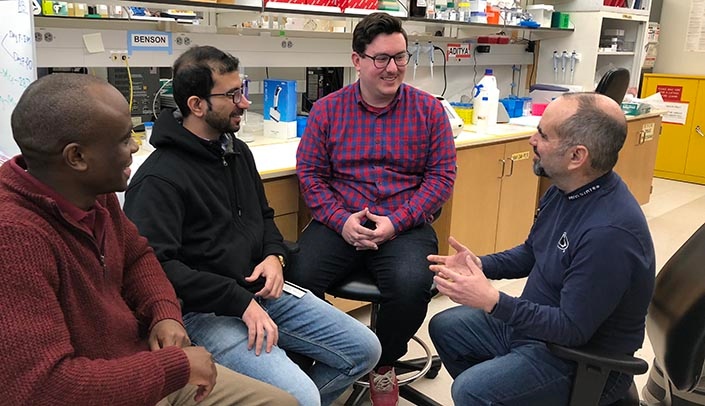In a significant breakthrough that could hasten an eventual HIV cure, a research team at UNMC has changed the chemical structure of an existing antiviral drug to facilitate it in reaching cells and tissues where HIV resides.
The discovery is detailed in the Feb. 5 issue of Nature Communications, one of Nature Research’s leading biomedical research journals.
Using a physiochemical scheme that alters the properties of the drug dolutegravir, UNMC scientists took the modified drug and placed it into nanocrystals. The produced drug crystals easily distributed throughout the body to tissue reservoirs of HIV infection.
The advanced drug scheme extended the life of the drug and its entry into “hidden body compartments,” from the muscle site of injection while increasing its action in reducing viral growth. The tissues included the lymph nodes, the bone marrow, the intestine and the spleen.
The modified drug crystals were not toxic, did not break apart with temperature changes and were stable for months of time. All organs and bodily functions remained intact after treatment.
Coated with parts of fat, the crystals efficiently maneuvered through cell protective membranes and were stored inside cells for weeks, said Howard Gendelman, M.D., professor and chair, who with Benson Edagwa, Ph.D., assistant professor, co-led the study in UNMC’s Department of Pharmacology and Experimental Neuroscience (PEN).
Once stored inside cells called macrophages, the drug was slowly released from the crystal in an altered inactive form called a “prodrug.” The cell then breaks the prodrug into an active drug, and the active drug is then released into the circulation from the cell and tissue stores.
“The strength of this system is that it not only can be effective in improving HIV care and prevention,” said Dr. Edagwa, who designed the drug chemical modifications, “but can be applied to many classes of drugs beyond HIV, such as drugs used to treat cancer, other infectious diseases and degenerative diseases that affect the brain.”
Importantly, Dr. Gendelman said, “the new products can optimize HIV restrictive growth so that strategies that may eradicate viral infection would be successful.”
Drs. Gendelman and Edagwa also recognized two other scientists who were instrumental to the discovery: Brady Sillman, a graduate student, and Aditya Bade, Ph.D., an instructor in PEN.
Sillman implemented the concept and completed many of the reports’ experiments and Dr. Bade performed the biological and virological testings.
UNMC has embraced the project, Dr. Gendelman said, with plans to soon complete a nanomedicine production plant that will enable the drugs and others like it to be produced on campus beginning this fall. Located on the 11th floor of The Lied Transplant Center, the plant will be a good manufacturing facility with an operating function similar to many pharmaceutical companies.
Patents have been filed and supported both by UNeMed, UNMC’s technology transfer partner, and ViiV Healthcare, a subsidiary of GSK (GlaxoSmithKline). The research was funded by ViiV Healthcare and by research grants from four institutes of the National Institutes of Health — Drug Abuse, Mental Health, Neurological Disorders and Stroke, and Aging.

Congratulations to the whole team!
Congrats. You have again put UNMC on the map. Plus making us very proud.
What a discovery!!!!!!
Congratulations to the whole team! What a discovery! Great!
Congratulations to the whole team! What a discovery! Great!
Congratulations to the team….what a milestone this is.
When is rolling trials
Congratulations to whole team for marvellous achievement. I bless them further achievement sand infinite success.
Congratulations to whole team
I’m very interested in this. I am hiv positive I’m very healthy my CD4 is in the 1200 range and would be interested in doing clinical studies it’s my belief that with a CD4 count like this that it wouldn’t hurt me to cut off my medication for a time to see if it does in fact work and could work for others I know my immune system is strong and at worst case I’ll just have to start taking my regular regimen and all would be fine I live in Colorado and we have no studies like this here if nothing else it’s a chance for change on how we look at this virus and fight like hell to be rid of it. Ronni P
Congratulation bro. You've made the world have hope for tomorrow. We shall always celebrate you as enter in the books of records. Am also proud of your team and the institution that you are working with for they gave you the opportunity that you would otherwise not get to showcase what you got for this world. May God be with you and grow higher than we expect.
Ndege Erick